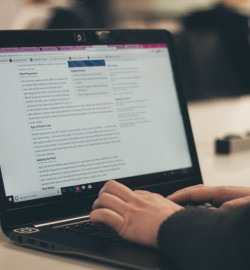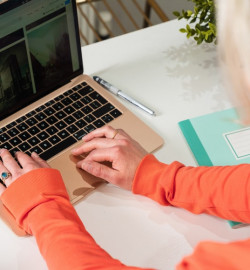Best Laptop for Remote Work: Top 7 Picks for Every Budget in 2023
Choosing to go remote with your career?
You are not alone.
FlexJobs have reported that 48% of people maintain some form of remote work. Besides, the trend for hybrid workplaces will grow from 41% in 2021 to 81% in 2024 (according to the same source).
However, choosing this work mode implies investing in your own tools and gadgets, specifically a laptop.
This guide will explain how to choose the right laptop for the nature of your work and share top 10 picks with average prices.
[The information about products is relevant as of 6 June 2023]
Overview of Our Top 10 Picks
Before we talk about each (in our opinion) best laptop for remote work, let us share an overview of the main characteristics, prices, pros and cons:
| Laptop Name | Best For | Specs | Pros | Cons | Price |
| MacBook Air | – Small business owners – SEO professionals – Project managers – Digital marketers | Display: 13″ -15″ CPU: M1 RAM: 8 GB/16GB SSD: 256 GB – 2 TB Battery life: 18h Weight: 1.27 kg (2.7 lbs) | – High-quality display – Touch ID security – Lightweight – Great battery life – Thunderbold universal port | – High price – Slow performance (compared to Pro) – Limited hardware updates – Freezes during high-performance tasks | $999 – $1299 |
| Macbook Pro | – Digital marketers – SEO professionals – Project managers – Influencers – Designers – Developers | Display: 13″ -14″ -16″ CPU: M2, M2 Pro, M2 Max RAM: 16 GB – 64 GB SSD: 2 TB – 8 TB Battery life: 22h Weight: 1.3 kg (3 lbs) | – Sturdy design – High battery life – Great display quality – Great performance | – Expensive – Hardware can be difficult to upgrade – Models with limited capabilities – Lacks HDMI and some essential USB ports | $1299 – $1999 |
| Dell XPS 15 | – Digital marketers – Social media managers – Writers and bloggers – Engineering students – Teachers – Travel agents – Real estate agents – Insurance agents | Display: 15.6″ CPU: Intel Core i7 – i9 RAM: 16 GB – 32 GB SSD: 512 GB – 1 TB Battery life: 10h Weight: 1.8 kg (3.9 lbs) | – Solid build quality – Great upgradeability – High display quality – Excellent sound quality | – Lacks essential USB ports – Poor cooling system – Relatively low battery life – Expensive | $ 1700 – $ 3700 |
| Acer Swift 3 | – Digital marketers – Social media managers – SEO professionals – Writers and bloggers – Teachers – Travel agents – Real estate agents – Insurance agents – Finance professionals | Display: 15.6″ CPU: Intel Core i5 – i9 RAM: 8 GB – 16 GB SSD: 256 GB – 512 GB – 1 TB Battery life: 9h – 12h Weight: 1.2 kg (2.6 lbs) | – Very lightweight – All necessary USB ports – Solid battery life – Good system performance | – Poor upgradeability – Non-upgradeable RAM – Glossy display – No SD card reader | $ 749 – $1099 |
| Microsoft Surface 3 | – Social media managers – Influencers – Graphic desighers – Writers and bloggers – Teachers | Display: 13.5″ CPU: Intel Core i5 – i7 RAM: 8 GB – 16 GB SSD: 256 GB – 512 GB – 1 TB Battery life: up to 17h Weight: 1.6 kg (3.6 lbs) | – Well-constructed – Great battery life – High performance – High-quality 3000-by-2000-pixel display | – Battery life is lower in tablet mode – Display sometimes wobbles – SSD extensions are very expensive | $619 – $1399 |
| Samsung Galaxy Book S | – Writers and bloggers – Teachers – Teachers – Travel agents – Real estate agents – Insurance agents | Display: 13.3″ CPU: Intel Core i5 RAM: 8 GB SSD: 256 GB Battery life: up to 17h Weight: 0.9 kg (2.1 lbs) | – Great battery life – Very lightweight – High-quality screen | – Weak processor – Slow performance – Low storage – Software compatibility issues | $639 |
| Xiaomi Redmibook 15 | |||||
| LG Gram | |||||
| Google Pixelbook Go | |||||
| Lenovo Chromebook Flex 5 |
7 Characteristics to Consider when Buying a Laptop
Before comparing and contrasting the best laptops for working from home, let’s consider a few important technical characteristics you should be looking for in a laptop fit for remote work.
1) Size and weight
The first feature of a laptop (and the one that catches the eye right away) is the size of the laptop. Here are the most common sizes of laptops found in most shops:
- 11-12 inches (around 30 cm). These are the thinnest and the lightest laptops on the market. A typical laptop of this size weighs up to 3.5 pounds (1.6 kg).
- 13-14 inches (around 35.5 cm). This is the best option if you like moderately sized screens and still want a laptop to be easy to carry around. A 13-inch laptop usually weighs around 4 pounds (2 kg).
- 15-16 inches (around 40 cm). This laptop size is the most popular. It’s the best option for those who want a bigger screen and don’t need to travel too often—the average weight of a 15-inch laptop is 5.5 pounds (2.5 kg).
- 17-18 inches (around 45 cm). These are the biggest and heaviest laptops on the market, weighing almost 12 pounds (5.5 kg).
Why do laptop’s size and weight matter?
You should take these characteristics into account if you’re going to work remotely from several different locations. If you’re not planning on traveling, then you can use the biggest and the heaviest work-from-home laptop. But a 12-pound laptop can be an inconvenience, considering most airlines have a 15-pound limit for carry-ons.
Apart from size and weight, consider the laptop’s build quality. Carbon fiber is the most popular material used in budget laptops, while premium models are built using anodized aluminum. Both materials should be able to withstand the 194 F (90 C) heat.
2) A Laptop CPU
A central processing unit or processor is the heart of a laptop. It has a great impact on a laptop’s performance and speed. The higher quality of a CPU means faster load time, the ability to run multiple apps at once without glitches, and fewer slowdowns during processor-intensive tasks.
You can choose between three CPU types:
- Low intensity. These processors usually have two cores (Pentium, Celeron, Intel Core i3).
- Average intensity. These are processors with two to four cores (Intel Core i3, AMD 8, AMD Ryzen 3 and 5).
- High intensity. These are some of the fastest processors, usually with six to eight cores (Intel Core i5, i7, i9, Xeon).
How do you choose the right processor?
If you’re choosing a home office laptop that you’ll use only for work, browsing the web, and watching content, you don’t need a high-end processor. But if you’re planning to play video games on your laptop, you need a processor with more cores. Intel Core i5 and i7 are the best options.
3) RAM and storage
Random Access Memory (RAM) is temporary computer storage that allows the CPU to instantly receive the necessary data. Essentially, when you open any program, it gets placed in RAM for the laptop’s processor to easily access it.
Laptops can have up to 64GB of RAM. If your routine work involves tasks that rely heavily on a big amount of storage, then, by all means, go for as much RAM as you can get. On average, good laptops for working from home have 16 to 32 GB RAM, which is enough to seamlessly run several apps at once. But the more programs you have pulled up simultaneously, the more RAM your computer will need.
4) Battery
Battery life is undoubtedly one of the critical characteristic features of a computer. If you plan to work from different locations, longer battery life means higher reliability of a laptop. You won’t have to take your charger with you. Besides, longer battery life can provide a lifeline if there is a power outage.
What’s the optimal battery life for a good work-from-home laptop?
The longer, the better. Some laptops (new MacBook Air and MacBook Pro) can hold the battery for up to 18 hours. But it comes with a price tag. More affordable options, such as RedmiBook, have an 8-hour battery life, which is enough for an entire workday.
5) Graphics card (GPU)
You can’t talk about choosing a laptop without mentioning the graphics card. This device is responsible for receiving and rendering an image to the laptop’s screen. A better graphics card means a smoother image.
Some of the best graphics cards on the market include:
- NVIDIA GeForce RTX 3090
- AMD Radeon 6900 XT
- AMD Radeon RX 6800 XT
- NVIDIA Quadro RTX A6000
- NVIDIA GeForce RTX 3080
These are all high-quality graphics cards that work well in both work and gaming laptops. But if you’re looking for the best laptop for remote work and not planning to use it for any other activities, choose one with an average GPU—the more expensive graphics cards consume more battery life.
6) Screen quality
Another crucial feature of a work laptop is screen quality. When choosing the laptop, you’ll come across three main laptop screen types. Let’s figure out which one is the best:
- Twisted Nematic (TN). If you’re looking for low-cost laptops, they will most likely have a TN screen. Such screens are cheaper to produce, have low power consumption, and decent color contrasts. But these screens have poor viewing angles, color reproduction, and no fixed image quality.
- In-Plane Switching (IPS LCD). These screens have better viewing angles than TN and higher vibrancy. You’ll also enjoy better color contrasts and overall screen consistency. Disadvantages include inefficient data consumption and slow pixel response time.
- Organic Light-Emitting Diode (OLED). This is the optimal screen type if you’re looking for the best laptop for remote work, which you will also use to watch various content. OLED screens have great brightness, color contrasts, full viewing angles, and color range while also having low power consumption. They are more expensive than IPS LCD and perform worse when put against direct sunlight, but OLED screens have more consistent performance.
When choosing your laptop, consider the screen type along with the resolution. You should feel comfortable navigating all the apps on the screen. Also, keep in mind that a brighter, more powerful screen will eat up more battery life.
7) Keyboard quality
It’s hard to disregard a laptop’s keyword quality, especially if you spend half of your workday typing emails and writing articles. The keyboard should feel comfortable and be easy to navigate.
Here are two main aspects for those who appreciate a good keyboard:
- Layout. There should be six rows of keys, left and right Ctrl and Alt buttons, and the Function row. The new generation of laptops usually doesn’t include a numeric keypad, so don’t forget to take it into consideration if you need an extended keyboard for work.
- Quality. A high-quality keyboard should not flex under pressure. Each key should have optimal key travel (minimal key travel can result in typos and feel awkward). Also, check if the keyboard rattles. Ideally, it should be static.
Keyboard quality is fundamental to a good laptop for remote work. So make a keyboard one of your primary considerations when purchasing a laptop.
Laptop Requirements for Digital Nomads
We’ve covered the essential characteristics to consider in a laptop. But naturally, every job will ask for different laptop requirements, and that’s what we’re going to cover below.
Laptops for digital marketing
We’ll start with one of the most popular remote jobs. Working in digital marketing doesn’t require you to own an over-the-top laptop stuffed with the latest GPU. However, there are a few characteristics you should keep in mind when choosing your laptop for remote work.
1) Digital marketers
Digital marketers are constantly putting out fires everywhere. Most marketing professionals have several apps or tabs running at the same time to have that content marketing strategy running smoothly. That’s not to mention the amount of workload and time you might spend on your planned and ad hoc tasks. With that being said, you’ll definitely need a laptop with a screen that won’t get your eyes tired.
Here are the basic laptop specs you should be looking for:
- A decent screen size—15” minimum.
- Screen resolution of minimum 1366 x 768.
- Average-intensity CPU (Intel Core i5 or i7).
- A precision touchpad.
- RAM beginning at 8 GB.
Also, don’t forget to check the camera quality. If you have dozens of meetings a day, you definitely need a laptop that can transmit a clear image.
2) Social media managers
Much like digital marketers, social media managers also need a fast laptop that will help you manage multiple tasks simultaneously. The processor’s speed also matters since social media managers have to craft and edit content across various platforms.
These are a few laptop requirements that would fit a social media manager’s needs:
- A 15” or 16” screen size.
- An 8 GB RAM minimum.
- Average-intensity CPU (i5 minimum).
- Fast graphics card for better image transmission.
- An average of 11 hours battery life.
You don’t need to buy the fastest laptop for social media management tasks, especially if you’re on a budget. But still, consider CPU when choosing. You don’t want a laptop that’s constantly freezing up.
3) SEO professionals
When working as an SEO manager, an average computer should suffice. However, this laptop should be powerful enough to let an SEO professional perform their key tasks: monitoring search algorithms, optimizing content and different landing pages, etc.
If your work involves SEO, here are a few requirements to pick the best laptop for your needs:
- 4 to 8 GB RAM
- 14” or 15” screen
- Good quality webcam.
- High-quality keyboard.
- Average-intensity CPU.
Don’t go for a low-intensity processor. The SEO job often involves extensive use of Excel, so the laptop should be able to get you across that finish line without getting you frustrated.
4) Project managers
It’s hard to pinpoint one laptop that would fit a project manager’s needs. Laptop specs will depend on the type of projects you oversee and how many applications the laptop will have to run at a time.
These are the minimum requirements a project manager should look for in a laptop:
- Minimum 8 GB RAM.
- Average-intensity CPU (minimum i5).
- A 15” screen on average.
- A fast graphics card (NVIDIA GeForce RTX series is a good option).
- High-quality keyboard.
If you have several daily meetings with your team, make sure you pick a laptop with a decent web camera.
5) YouTubers and influencers
Influencers and YouTubers, in particular, have to work with a lot of visual content that requires editing and retouching. Basically, you will need a laptop that will handle big volumes of content and won’t crash.
What laptop specs should you be looking for? Here are some suggestions:
- High-resolution 15” screen minimum (Retina display preferred).
- Minimum 512 GB RAM.
- Average-intensity i5 CPU.
- High-quality fast GPU.
- Precision touchpad and good-quality keyboard.
Influencers often work on the go, so battery life also matters. Opt for a laptop that can handle the job while away from the power outlet.
6) Writers, bloggers, and journalists
At first thought, writers don’t need a state-of-the-art laptop jam-packed with the latest features, and it’s true to some extent. While you might not need a GPU on steroids (which can make a laptop pretty expensive), you still need a powerful electronic sidekick to assist you with your work.
Here are some of the laptop specs you should consider:
- Average-intensity CPU.
- A minimum of 11 hours battery life.
- A 15” screen with Retina or OLED display.
- At least 512 GB SSD and 8 GB RAM.
- A high-quality keyboard.
The keyboard and touchpad should be the first things to consider in a laptop for writers. They must be durable and well-built to survive hours of clicking and typing.
Is Mac or Windows better for marketing?
While Mac is considered the staple at the digital marketer’s workstation, some people are more comfortable with Windows and absolutely hate working on Mac computers.
Also, make your decision based on what your enterprise uses. If all your co-workers use Windows, then so should you—it will be easier for you to troubleshoot issues.
Best Laptops for Coding and Programming
Developers usually need more advanced laptops due to the intricacy of their craft. There’s no one-size-fits-all option: you’ll have to look for a computer that will be able to withstand hours of detail-oriented work managing several high-intensity tasks at a time.
Let’s see what you should be looking for.
1) Software engineers, coders, and developers
Programmers and software engineers need a fast and reliable device to design, develop and test software, apps, and other products that involve writing code. In most cases, you might need additional monitors to keep track of all the tasks.
Here are the basic recommendations for choosing the right laptop for software engineers, coders, and developers:
- High-intensity CPU (i7 or i9).
- 17” screen (but make sure you pick a portable laptop).
- At least 1 TB SSD.
- High-quality NVIDIA GPU.
- Minimum 16 GB RAM.
- A high-precision touchpad.
- High-quality keyboard.
Also, consider buying a laptop with an x86-bit system—it’s the optimal solution if you’re going to test software regularly and don’t want your computer to stall.
2) Sysadmins
Sysadmins need a trustworthy laptop to perform their routine system maintenance and network administration tasks. Typically, reliability is the most desired quality of a laptop for someone in that line of work.
Here are some laptop specs you should be looking for:
- An average-intensity CPU with at least Intel Core i5.
- 8 GB RAM minimum.
- At least 512 GB SSD.
- A 15” screen minimum.
- A high-quality touchpad and keyboard.
You won’t need the greatest and fastest laptop as a sysadmin since you won’t be doing much data processing. However, it should be reliable enough for you to connect and manage multiple users in one network.
3) Engineering students
Engineering students undoubtedly need a good machine to learn how to write code. It should offer the base package any average computer does, but it should also be powerful enough to support your needs if you decide to work part-time.
So, here’s what you need to be looking for:
- A high-intensity CPU (Intel Core i5 minimum).
- At least a 15” screen.
- A minimum of 16 GB RAM.
- A high-quality GPU (NVIDIA RTX series).
- At least 512 GB SSD.
These are the specs of a good-quality laptop, but it will most likely cost you a pretty penny. You can downgrade to 8 GB RAM, but still try to look for a laptop with a high-intensity CPU – it’s essential for testing the code.
Laptop recommendations for other remote jobs
Digital marketers and developers aren’t the only two remote job groups in need of high-quality, affordable laptops. Here are a few more professions that need a reliable device to do remote work.
1) Teachers and online coaches
If you’re teaching online, you don’t necessarily need an expensive laptop, but it should have a few essential features to support numerous Zoom calls and help you edit content for your online classes. Here are the basic laptop specifications teachers and online couches should be looking for:
- At least 8 GB RAM.
- A minimum of 256 GB SSD.
- A 13” screen minimum.
- Low- to average-intensity CPU.
- High-quality webcam and keyboard.
On top of that, look for a laptop with decent battery life. It should be able to get you through at least 11 hours of work without a power cord in case you experience a power outage in your area.
2) Travel agents
If you work as a travel agent, you can choose any affordable laptop on the market. Since your job doesn’t involve a lot of data processing, you can opt for the most basic features, including:
- A low-intensity CPU.
- 256 GB SSD.
- 8 GB RAM.
- A 13” screen.
- A minimum of 8 hours battery life.
What you definitely need in a laptop is a good-quality webcam. Since you’ll have to connect with your clients remotely, you will most likely have several Zoom meetings a day, making an advanced webcam that can transmit a high-quality image your top requirement.
3) Real estate agents
Realtors also don’t need an extraordinarily expensive laptop to do daily tasks. However, you will need a laptop that can run multiple applications at once without crashing.
Here are the specs you might want to consider:
- A 13” screen minimum.
- A low- to average-intensity laptop.
- At least 8 GB RAM and 256 GB SSD.
- High-quality webcam.
- A minimum of 11 hours battery life.
Also, make sure you choose a portable laptop. As you’ll be travelling from one spot to another, a hefty load is the last thing you want to have in tow.
4) Insurance agents
Similarly, insurance agents don’t need a high-end laptop to run daily operations. But you still want to have a device that runs several applications smoothly and withstands more than 10 hours of work.
Here are the basic laptop features an insurance agent should look for in a laptop:
- Low- to average-intensity CPU.
- 8 GB RAM and 256 GB SSD.
- 14” display size.
- High-quality webcam for daily meetings.
For insurance agents, a lot depends on the portability factor as well. Choose a lightweight laptop with average screen size, but don’t skimp on the screen’s quality and dimensions.
5) Finance professionals
Accountants and finance professionals need a laptop that will support several tasks at once. Working with accounting software often involves long hours of data input, so you’ll also need a device with long battery life.
The basic laptop features finance professionals should look for include:
- 15” high-resolution screen.
- Average-intensity CPU (i5 minimum).
- 8 GB RAM.
- 256 GB SSD.
- High-quality webcam, keyboard, and touchpad.
While GPU matters for a high-quality image, you don’t need to overpay for it. Instead, focus on choosing a portable laptop with good battery life.
6) Small business owners
The choice of a laptop will greatly depend on the type of business you run. For instance, an e-commerce shop owner and a SaaS business owner will need laptops with completely different specs.
However, there are a couple of must-have features we suggest for a small business owner’s laptop:
- Average- to high-intensity CPU (i5/i7).
- 16 GB RAM.
- 512 GB SSD.
- High-quality graphics card.
- High-quality webcam for meetings.
It might seem that all laptops with these specs will be pretty expensive. However, you can still find an affordable laptop, such as RedmiBook, for under $1,000.
Best 7 Laptops for Remote Work
Choosing the best work-from-home computer is a tough task to do; there’s so much you need to take into account.
To save you this trouble, here are the seven best laptops you can consider for the home office.
1) MacBook Air
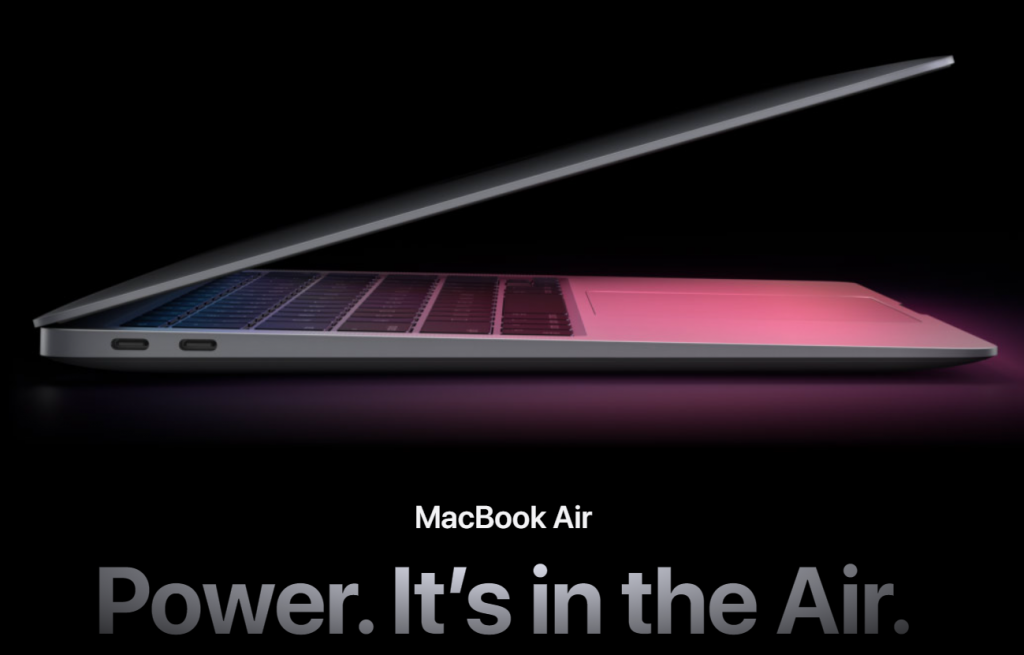
Size: 13 inches
CPU: Core i3
Storage: up to 512 GB SSD
Battery life: 18 hours
GPU: Apple 8-core
Apple’s MacBook Air is, without a doubt, the best laptop for remote work. It has everything you need—a big enough screen size, a quick processor, macOS, a high-quality hard drive, more than enough storage, and long-lasting battery life.
But the main feature that makes MacBook Air perfect for remote work is its scissor-switch keyboard (all keys interlock together in an X shape)—a major change from a butterfly-switch keyboard that brought many issues.
The display is another outstanding quality of this laptop. MacBook Air has a Retina full HD display, which has great color saturation and higher resolution. If you’re working in graphic design or a similar field, this is the best laptop for the home office.
2) MacBook Pro
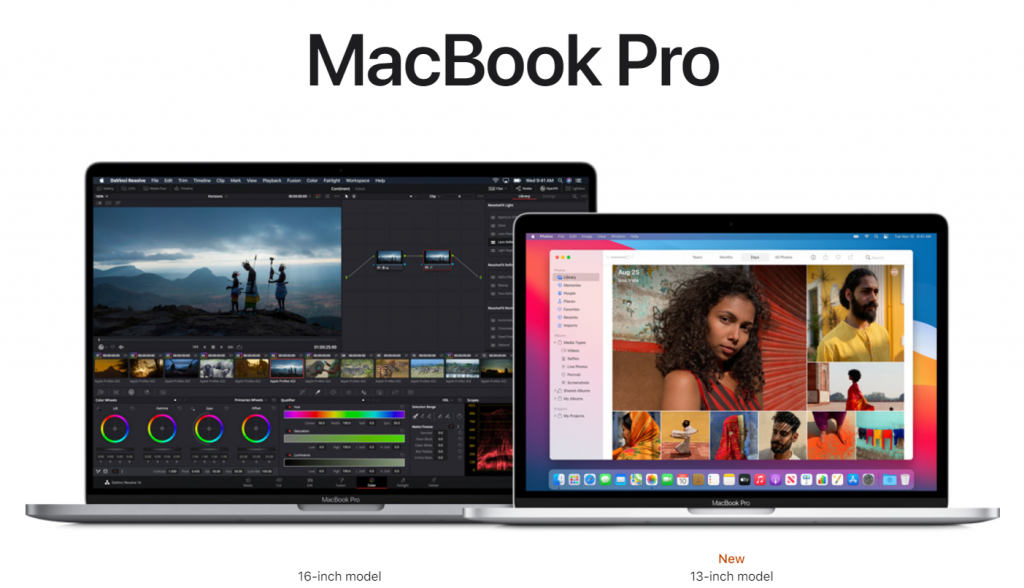
Size: 13- and 16-inches
CPU: Core i5/i7 or i8/i9
Storage: 2 and 8 TB SSD
Battery life: up to 20 hours
GPU: Apple 8-core
MacBook Pro is a real beast. An ultra-fast processor and large storage make it suitable for any type of remote work. On top of that, the device has up to 20 hours of battery life, making it the best laptop for a digital nomad.
Much like MacBook Air, MacBook Pro has a Retina display and an excellent build quality. However, what truly makes MacBook Pro a better remote work laptop is its web camera that transmits a high-quality image. If you have many meetings during the day, your colleagues will feel like you are in the same room with them.
MacBook Pro comes in 13- and 16-inch versions, but the 16-inch laptop has lower battery life. However, it’s still enough for a full workday on the go.
3) Dell XPS 13
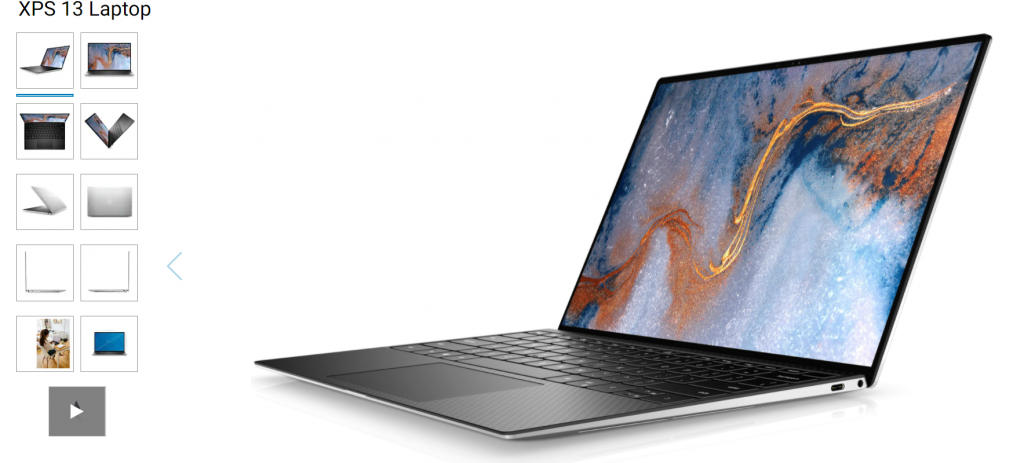
Size: 13.4 inches
CPU: Core i7
Storage: 512 GB SSD
Battery life: up to 14 hours
GPU: Intel Iris Xe graphics
Dell is a popular business laptop brand, but it doesn’t mean it’s not suitable for the home office. Dell XPS 13 is a Windows-based new-generation laptop with a powerful i7 processor. The battery life is also impressive—14 hours uncharged, which is enough for you to finish all your work and even do some non-work-related typing and reading.
Dell XPS 13 is also the best laptop for the home office because it’s very compact. Its infinity display, although quite small, has an edge-to-edge screen, meaning that this laptop has great portability and won’t take too much space. The build quality is inferior to MacBook Air and Pro but wouldn’t be a disappointment for Windows users.
Although overall good, this laptop has a couple of cons—screen brightness and touchpad. Dell XPS 13 can be hard to use on a sunny day, and there is no distinction between the left and right touchpad sides.
4) Acer Swift 3
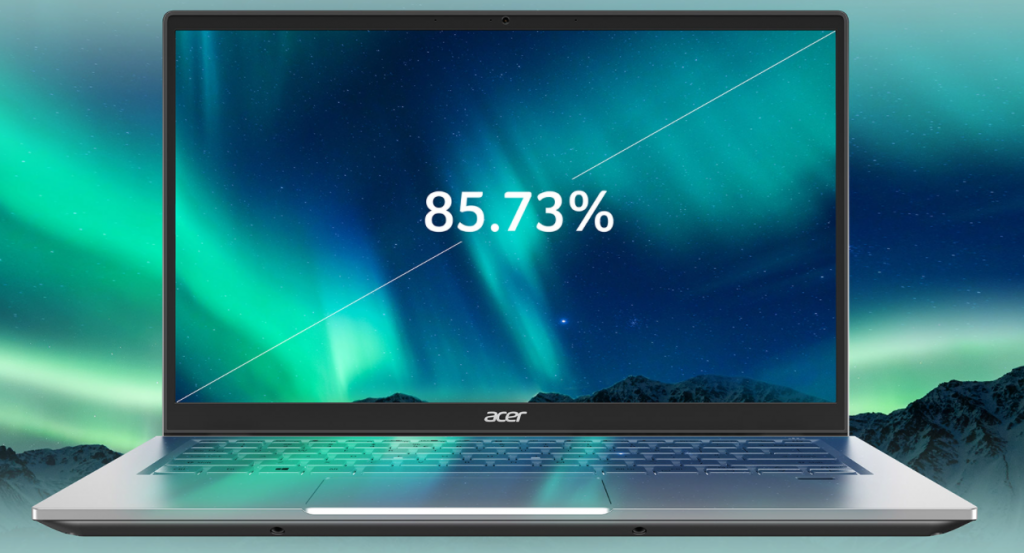
Size: 14 inches
CPU: AMD Ryzen 7 4000-Series
Storage: 512 GB SSD
Battery life: up to 11.5 hours
GPU: AMD Radeon graphics
If you’re looking for the best laptop for remote work but don’t want to spend a fortune on it, Acer Swift 3 is the best option. It’s a Windows laptop but has the characteristics of a MacBook Air and costs half the price. Its most outstanding feature is the 85% screen-to-body ratio with a high-quality display, making it a perfect fit if you work with the graphics.
For those, who are concerned about privacy and security, Acer Swift 3 has a fingerprint reader. You can activate it if you want to limit access to the laptop. There is also a Cortana-enabled Wake on Voice (WoV) feature you can use to activate the laptop when the screen is off.
In general, Acer Swift can be called the best work laptop, but for one minor pitfall. This laptop doesn’t have an SD card slot, which can be a disadvantage for those who need a laptop for video editing. Other than that, it’s a solid laptop for working remotely.
5) Microsoft Surface Book 3
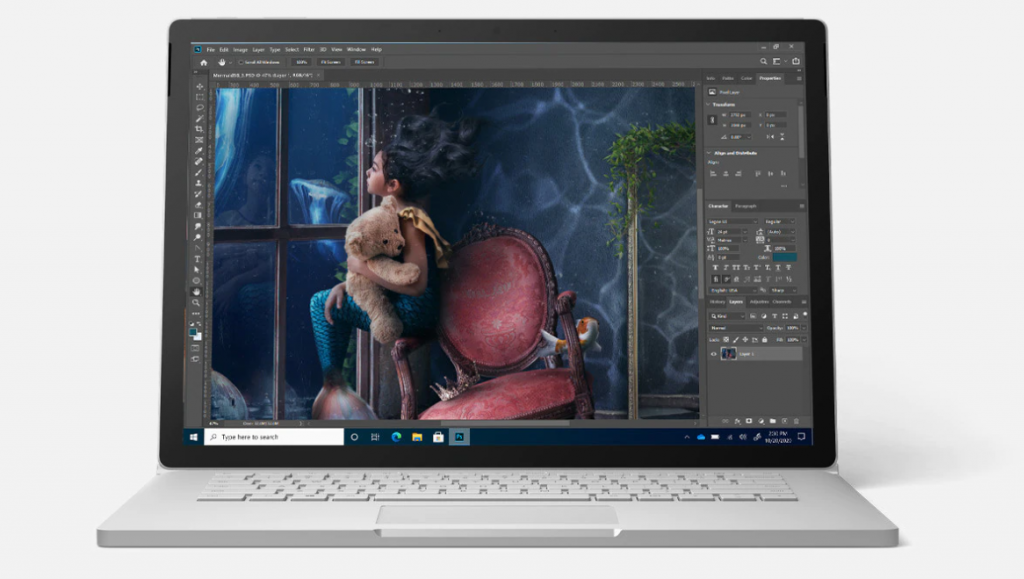
Size: 13.5 and 15 inches
CPU: Intel Core i7
Storage: up to 2 TB SSD
Battery life: up to 17.5 hours
GPU: NVIDIA Geforce graphics
This is, by far, the most unusual device—you can use it as a laptop, drawing studio, and a tablet. You don’t have to worry about the touchscreen quality—it uses an innovative PixelSense technology which increases its durability.
Microsoft Surface Book 3 is a powerful machine. Its 13.5-inch version has an i5 processor, which is reliable enough for the home office. The laptop also has a good battery life—17 hours, even if the screen is on non-stop.
Microsoft Surface Book has one major disadvantage—its price. It is quite costly ($1,400) even compared to MacBook Air, which has a far better CPU. However, features like a detachable screen make it a good work-from-home laptop—it’s portable and compact.
6) Samsung Galaxy Book S
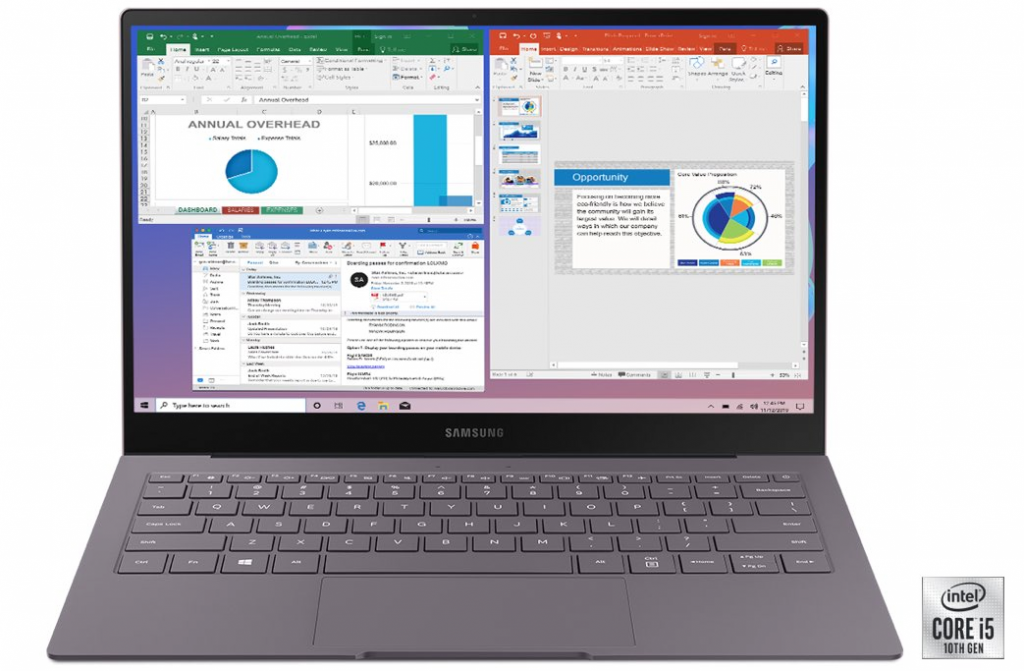
Size: 13.3 and 15.3 inches
CPU: i5 Intel Core
Storage: 256 GB SSD
Battery life: up to 21 hours
GPU: Intel UHD Graphics
On our hunt for the best laptop for remote work, we can’t skip Galaxy Book S, Samsung’s innovative computer.
Why is this laptop on our list?
First of all, it has better Wi-Fi connectivity and downloads files three times faster compared to other laptops on our list. This feature is possible thanks to the laptop’s high-performance wireless hardware. You can also choose an LTE version of the Galaxy Book if there is no Wi-Fi connection in your area.
Another feature that makes Galaxy book the best computer for remote work is its durability— mind-blowing 21-hour battery life is definitely a perk for freelancers who prefer to work from different locations.
A minor issue that you might find upsetting is the device’s keyboard. The key travel makes it hard to work on this computer for several hours straight. Besides, the laptop doesn’t have enough ports for USB, if that’s a deal-breaker to you.
7) Xiaomi RedmiBook
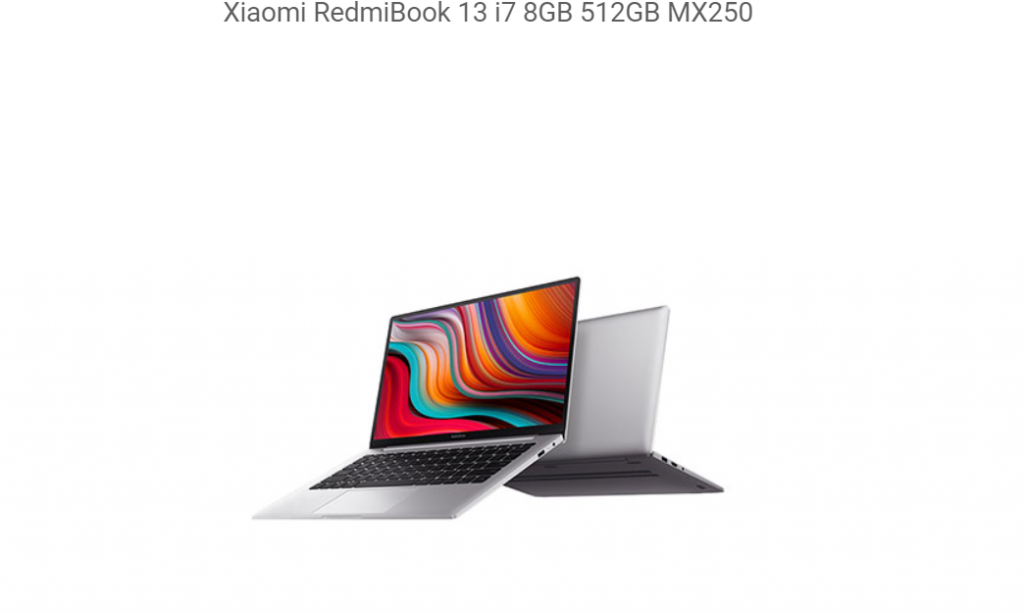
Size: 13 inches
CPU: i5 Intel Core
Storage: 512 GB SSD
Battery life: up to 11 hours
GPU: NVIDIA GeForce MX250
Our last pick on the list of the best laptops for working from home is Xiaomi RedmiBook. This is an ultrathin laptop with a powerful 10th-Gen Intel Core i5 processor, which makes this device great for multitasking.
If you work from home most of the time, you will enjoy the battery life this laptop has—up to 11 hours. The keyboard is pretty solid, much like the overall laptop build. The laptop has an HDMI port and two USB adapters.
For those who are looking for the best budget laptop for working from home, RedmiBook is a great option. It costs $699, and you still get most of the MacBook’s features for this price. The only disadvantage is that this laptop doesn’t have a webcam, which you can buy separately. All in all, RedmiBook is a good choice for a home office laptop.
Laptops for Digital Art and Content Creation
Which of the laptops mentioned above is the best pick for working remotely?
There is no definitive answer, considering that each remote job is unique in nature. But we can try to break down the most common activities related to remote work.
1) Digital art
A good laptop for digital art should possess the following basic characteristics:
- A high-intensity CPU to handle task-heavy applications.
- An up-to-date graphics card to render high-quality images.
- At least 16 GB RAM and 512 GB SSD.
- A high-resolution display, preferably with a touchscreen.
If you produce digital art, the best laptop among our picks is Microsoft Surface Book 3. It has all the tools for a drawing studio and can be used as a tablet.
2) Video editing
Video editing is a task that needs a high-intensity CPU. Intel Core i7 is the perfect option you should consider in a laptop. Besides, the device should have a high-quality graphics card as well.
Some other laptop features necessary for video editing include:
- High-resolution screen, preferably 17” inches.
- Minimum 16 GB RAM and 1 TB SSD.
- Precision touchpad.
The best laptop for this job will be either MacBook Air, Pro, or Microsoft Surface Book 3 if you prefer using Windows. These laptops are equipped with enough memory to store large volumes of video footage and have processors with enough cores to tackle high-intensity tasks.
3) Photo editing
Photo editing software, though less demanding than video editing tools, still requires a laptop with high productivity and performance capabilities. What you should be looking for is a good graphics card since it impacts the image quality.
Other laptop specs you need to consider for photo editing include:
- Average-intensity CPU.
- Minimum 512 GB SSD and 16 GB RAM.
- A high-resolution 15” screen.
All laptops on our list fit these requirements, aside from battery life and price. If money is not the issue, you can go for a MacBook or Microsoft Surface Book. A more affordable laptop is the Xiaomi Redmibook.
4) Content writing
Content production and writing, in general, do not require a high-end laptop. But there are three things you still should consider:
- A keyboard.
- A screen size.
- A touchpad.
The laptop’s build is the most important criterion to consider for content writers. All the laptops on our list are perfect for this task, but MacBook Pro and Air are still at the top as they have the best-quality keyboard.
5) Music production
Much like video and photo editing, music production requires a powerful laptop. The key feature you’re looking for is, of course, CPU–look for a high-intensity processor, such as Intel Core i7.
Also, make sure you take the following specs into consideration:
- 1 TB SSD.
- 16 to 32 GB RAM.
- A high-resolution screen.
As for the OS, both iOS and Windows will do well, but make your choice based on your own preferences. Among the options mentioned before, MacBook Pro is the best laptop for music production.
6) Video conferencing
At this point, you need to distinguish whether you need a laptop for daily meetings or to run a large conference. If you need a laptop for a quick call with your colleagues, then all you need to worry about is a webcam, a decent CPU, and GPU to quickly transmit a high-quality image.
However, if you want to use a laptop for large online events, then it should be durable enough to withstand long hours of intense work. Look for nothing less than an i5 CPU, good graphics card, at least a 15” screen, high-quality microphone, and a webcam. Samsung Galaxy Book S and Acer Swift 3 would do great at helping you manage your online events.
What’s the Best Laptop for Remote Work?
Finding the best work computer is a real challenge, considering how many options there are on the market. Choosing the best laptop for remote work is even harder—you need a reliable device for your home office.
Your choice will depend on multiple factors, like size, CPU, SSD storage, battery life, GPU, etc. The laptop’s price also plays a crucial role. If you’re ready to splurge, Macbook Air and Pro are the best laptops for remote work. But, if you’re on a budget, Acer Swift 3 and Xiaomi RedmiBook are great options at a relatively low price.

